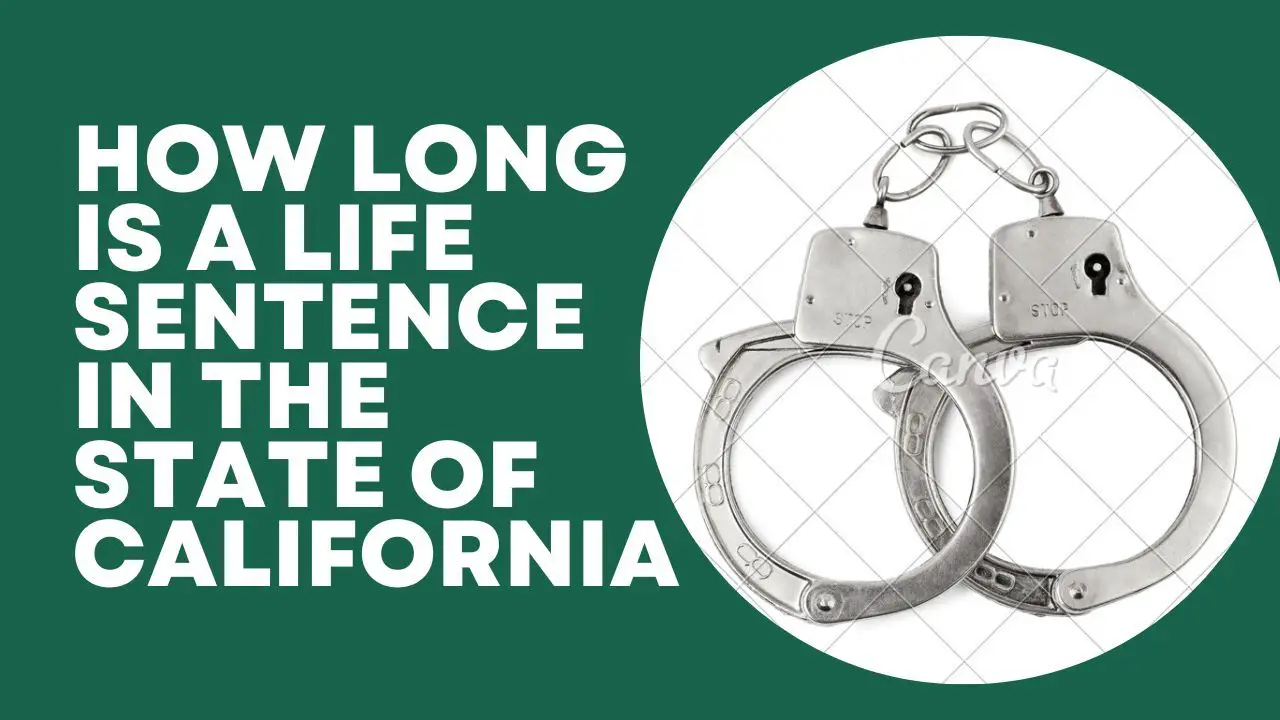How Long Is A Life Sentence In The State Of California
How Long Is A Life Sentence In The State Of California? In this article, we have discussed How Long Is A Life Sentence In The State Of California.

Life sentences in the state of California might be 25 or 30 years long. If a gun is used in a crime, the number of years can be increased. California, like many other states, has a life sentence without the possibility of parole.
If an inmate is serving a life without parole sentence, they may spend the rest of their life in prison. However, attorneys suggest that the offender can request parole at hearings and write or have a family member or friend write a parole letter to speed up the process.
Still, no prisoner serving a life sentence may be released from custody until he has completed at least seven calendar years of his term, according to the Supreme Court of California's interpretation of section 3046. It implies that parole may only be granted to inmates after seven years in cases of a life sentence in California.
Practically speaking, though, this is not the case regarding life sentences in California. There could be two possible reasons;
- The defendant has been convicted of felonies previously
- The defendant is being convicted of a felony that involved firearms
In both cases, the minimum imprisonment is usually more than seven years.
When Is Life Sentence In California Imposed?
The ability of the court to impose LWOP penalties is limited. It may only do so in the situations that are outlined below;
Statutorily permitted LWOP Sentences:
A person may only receive an LWOP sentence if they are found guilty of a specific offense, such as first-degree Murder, rape, or other violent sex crimes with particular aggravating circumstances present. A defendant may also receive an LWOP jail term if they were found guilty under the "felony-murder" rule.
- First-degree Murder According to Penal Code 187: First-degree Murder in California is defined by state law as a motivated voluntary killing of a person or an unborn fetus. This includes murders that are planned before they are performed, such as those caused by rape, carjacking, and armed robbery.
- Felony Murders In California: Not all murders are pre-planned. Some could be done in the "heat of the moment." For instance, if someone murders a person after an argument, the criminal is given a first-degree murder sentence of 25 years in jail. However, in cases of mass murders/multiple deaths, the ruling could be different. For instance, if the offender kills multiple people after trying a car robbery and driving the victims over, the offender may receive a life sentence in California.
- Rape In California: A person convicted of rape (forced sexual intercourse) will be charged with eight years of prison and will also be labeled as a registered sex offender by a sexual harassment lawyer. However, if the victim dies, this offender may get a life sentence in California.
Enhancement In Life Sentence:
When certain sentencing modifications related to the defendant's base offense are found accurate, the court may impose an LWOP sentence.
Suppose aggravating circumstances are proven to be accurate, and a person is found guilty of one of the above sex offenses or found to have a criminal record for any first-degree or felony murder cases. In that case, the court may allow an LWOP term.
Age-Based Exceptions in Life Sentence In the state of California:
Despite the general rules, if the offender is reported to be a juvenile at the time of the crime, the United States Supreme Court and California deem it inappropriate to charge them with a Life without Parole sentence.
An exception exists in murder cases that allows the court to apply this sentence to a minor after conducting an individual evaluation of age-related considerations.
Death Penalty & Life Sentence In California:
According to California Penal Code, the defendant presents an application to the California Supreme Court for a modification of the verdict/finding in every case that imposes a death penalty or life sentence without the possibility of parole.
A lower court appeal is not necessary. The judge evaluates the evidence that was correctly given in court, considers any extenuating or mitigating circumstances, and decides whether the evidence and circumstances adequately support the verdict/findings before deciding on the application. The judge must then note his or her justifications for approving or rejecting the defendant's application.
Can You Appeal Against A Life Sentence In California?
There are three most common ways to modify or reduce the LWOP sentence in the state of California after conviction.
Direct Appeal:
The earliest and simplest way for a defendant to contest a conviction for LWOP is by a direct appeal from the trial court's decision. All transcripts, exhibits, or motions from the trial court proceedings are things that can be contested on direct appeal. Something not brought up during the trial may not be brought up later on appeal.
However, on a direct appeal, you can argue that there were problems at your trial that should have resulted in a lighter sentence. Your options for appealing your sentence directly will be fully explained to you after a careful study of your case by an experienced appellate lawyer.
Note that these appeals are time-restricted, and a defendant must file a "notice of appeal" within 60 days with the Superior Court. Plus, a defendant can only file a direct appeal from his sentence only once.
Writ of Habeas Corpus:
Already filed an appeal? Or did you miss the deadline to file a direct appeal? Well, there is another way out. In unusual or extraordinary circumstances, you can request the court to issue you a writ of habeas corpus.
The court must review your case based on any information that was not contained or included in your trial. In such scenarios, the court can also issue you an order of release since you were arrested unlawfully.
However, in other cases, submitting a writ of habeas corpus petition gives the defendant who has been given a life sentence in California without the possibility of parole a chance to have their conviction vacated, but a fresh trial might come next.
Governor's Grant of Commutation:
A person serving a sentence in a state prison may request a sentence reduction in a commutation application, even if there are no legal challenges to the ruling. This character-based application reduces or terminates a prisoner's sentence rather than changing the conviction.
It is based on a variety of factors, including;
- Behavior while incarceration
- Modifications to state/case law which, if they had been in effect at the time of the crime, likely would have resulted in a different sentence
- Modifications to legislative intent or trends since the applicant's sentencing
- Other proof of rehabilitation and likely success after release
Frequently Asked Questions:
What do 40 years of life mean in California? Generally, in the United States, a sentence of 20 years or more is considered a life sentence. However, in cases of repeated or multiple offenses, usually first-degree, the judge can consecutively give offenders two or more life sentences. This means they must wait almost twice as long to be eligible for parole.
How many lifers are in California prisons? According to the findings of a report presented by the Public Policy Institute of California, there are about 33,000 people serving life sentences in different state prisons in California.
Read more related articles:
- 5 Crimes That Classify for Life Sentence in Texas
- How Do I Write A Letter To Help Someone Get Out Of Prison?
- 9 famous prisons in the state of North Carolina
- 10 Famous Prisons in The State of Delaware
- 10 Famous Prisons in The State of Ohio
- 10 Best Prisons In The State of Ohio
- 10 Famous Prisons In The State of Texas
- Can You Visit Kerobokan Prison?
- How Does an Inmate File Taxes In The US?
